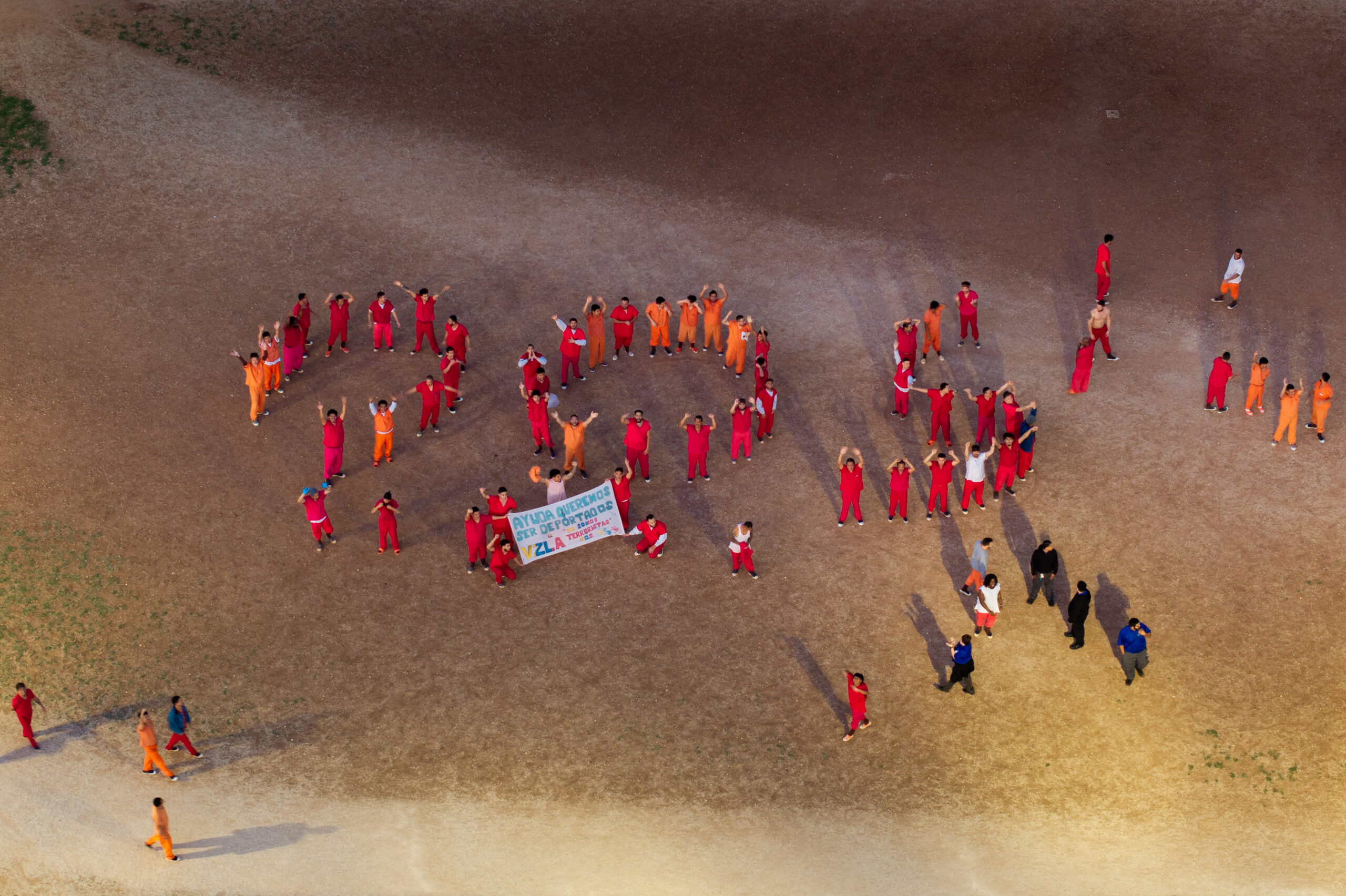
A group of Venezuelan men who were almost sent to El Salvador before an overnight Supreme Court decision stopped their flight have been pleading for help as they remain detained in Texas.
Since President Donald Trump invoked the Alien Enemies Act of 1798 on March 15 against the Venezuelan gang Tren de Aragua, his administration has sent more than 200 Venezuelans to El Salvador. The government of El Salvador immediately sent the men to one of its notorious prisons. Human rights experts have called this practice enforced disappearance.
As the administration prepared to send more Venezuelan men to El Salvador on April 19 from Bluebonnet Detention Center in Anson, Texas, the Supreme Court blocked the flights.
“I’m afraid for my life, truly,” said one man who remains in custody after his flight was blocked by the court’s decision.
He and other detainees are not being fully identified for fear of retribution.
Immigration and Customs Enforcement did not respond to Capital & Main’s request for comment.
Using tablets in their housing unit at the detention center, the men sent messages through recordings their loved ones made of video calls to tell the world how terrified they are of ending up in a Salvadoran prison. Some of the videos were posted to TikTok. Some ended up in the hands of journalists.
A group from the housing unit recently spelled out “SOS” for Reuters to photograph while they were out in the yard.
The man who spoke with Capital & Main said that he and other detainees received bread and lettuce for meals and that they were not often allowed to go out to the yard, despite custody rules that require at least five hours of outdoor time per week, weather permitting. Management and Training Corporation, the private prison company that runs Bluebonnet, did not respond to a request for comment.
“We ask what’s going to happen. They don’t answer,” he said in Spanish. “We don’t know what’s going to happen to us.”
He said that the men received documents on April 18 telling them that ICE was removing them from the country under the Alien Enemies Act, hours before their flight was scheduled to leave. He said the men asked where ICE was sending them, and they didn’t get an answer. He said he refused to sign the document.
Officials loaded the men onto a bus, he said, but at some point, the bus turned around and they ended up back at the facility. Officials quickly gave the men the same clothes and identification cards they’d had before and put them back in a housing unit, he said.
“They didn’t say anything,” he said.
Since then, the men have been demanding answers, including in a conversation with an immigration official who came to their unit recently.
In a recording of the conversation heard by Capital & Main, one man tells the official that ICE previously sent him to Guantánamo Bay, Cuba.
“I don’t know what you want to do with me,” he tells the official in Spanish. “Well, do you want to disappear me?”
Several say that they had committed no crimes. One man says that ICE saw a photo of his family on his phone when he was arrested. Another says ICE arrested him thinking he was someone else, but he still ended up in the detention facility and almost on a plane to El Salvador.
One man says that he was a professor in Venezuela and that ICE took him from the facility where he was previously held the day before he was supposed to go back before an immigration judge to try to get released on a bond.
“So if I don’t have a criminal record in the three countries where I’ve lived, and in Venezuela, I taught classes, how are you going to send me to El Salvador including me in a gang?” he asks, frustration audible in his voice.
Since the public attention on their situation, ICE transferred the men to Prairieland Detention Center in Alvarado, Texas, where they have been held in what the men call “the hole,” according to Brianna Henderson, a friend of one of the men who has stayed in close contact since ICE arrested him. Though ICE officially calls the unit segregated housing, such units are a form of solitary confinement.
According to Henderson, the men haven’t been given a change of clothes, and they now can’t access phones or tablets most of the day since they remain locked in their cells instead of being allowed to move around the unit. She said they are allowed to shower only three times per week.
“They’re being treated like criminals down there,” she said.
LaSalle Corrections, which operates Prairieland, did not respond to a request for comment.
Several of the men, according to Henderson, have had judges approve their requests for bond, but ICE has appealed, and the men remain detained.
The man who spoke directly with Capital & Main said that even though he had fled Venezuela due to concerns of political persecution, he preferred to get deported there over remaining in U.S. custody because of the likelihood that he could end up in a Salvadoran prison.
“We are afraid for our lives. We’re all ready to go to our country — Venezuela,” he said, emphasizing the country’s name. “We are afraid for our lives in El Salvador.”







